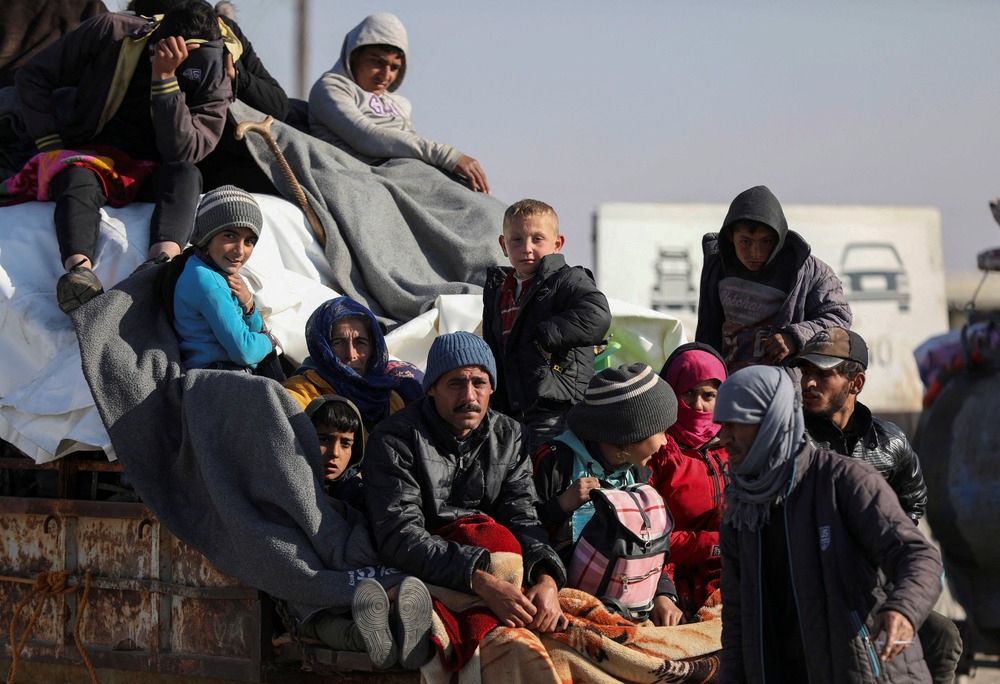
Displaced Syrians who fled from the Aleppo countryside ride on a vehicle with their belongings in Tabqa, Syria, Dec. 3, 2024. (OSV News/Orhan Qereman, Reuters)
An uneasy calm hangs over Aleppo, Christian leaders report, following the recent lightning takeover of Syria's second-largest city by Islamist rebels driving out forces of Syrian President Bashar Assad. Concerns also mount over government airstrikes.
"A relatively calm day compared to previous days," a Catholic priest in Aleppo, who asked not to be identified given the sensitivity of the situation, wrote in a letter made available to OSV News.
"However, this doesn't mean there haven't been problems of various kinds: Certain food supplies are already running low in the modest market available, and the survival instinct is pushing people to gather anything that can feed them, starting with bread. Several distribution points in the city are emptying quickly," he added.
"The situation is confusing. We don't know what will happen. People outside cannot reach Aleppo because it is closed off and under occupation," Andrea Avveduto, communications chief for Pro Terra Sancta, told OSV News by phone.
Pro Terra Sancta, based in Jerusalem and Milan, Italy, supports the Franciscan Custody of the Holy Land. Since the start of the conflict, it has aided Franciscan fathers in Syria by opening four emergency centers in Damascus, Latakia, Aleppo, Knayeh and Yacoubieh.
"The jihadist leaders met the friars and priests and told them not to be worried. They want to protect them and will allow them to continue to do all their activities in support of the population," Avveduto said. But Aleppo's Christians and other religious minorities worry for their future. "Many stay shut inside their homes due to fear," Avveduto said.
Pope Francis on the first Sunday of Advent condemned the raging war, expressing his concern for Syria, where Aleppo is under the control of jihadist groups, most prominently the Hayat Tahrir al-Sham and other jihadists and pro-Turkish Sunni militias.
"Let us pray for Syria, where unfortunately war has flared up again, claiming many victims. I am very close to the Church in Syria," the pope said Dec. 1.
Some 50,000 Syrians have been displaced in recent days.
Aleppo was once Syria's thriving commercial hub and one of the world's oldest continuously inhabited cities, but it suffered immense damage and destruction during Syria's 13-year civil war, which saw its prosperous Christian population diminished. Observers say the rebels reignited a frozen conflict which has already left more than 300,000 civilians dead.
According to the United Nations refugee agency UNHCR, over 12 million Syrians remain forcibly displaced in the region, including almost 6.8 million within the country and 5.4 million living as refugees in neighboring countries.
"Our staff who were outside of Aleppo during the rebel takeover have so far not been able to reenter. So, the friars and volunteers are carrying on the ministry to the people," Avveduto said.
Advertisement
The Franciscan-run Terra Santa College was hit by a strike on Dec. 1.
"Thanks to God, there were no fatalities or casualties, only the building was damaged. Our friars and the faithful of the parish are all well. We are in constant contact with them from our Curia," the custos of the Holy Land, Father Francisco Patton, said in a Dec. 1 statement.
"For the time being they are informing us of the growing tension and fear of the civil population of Aleppo for the unforeseeable developments of the confrontation underway, the custos said.
"We invite our friars, the Christians of the Holy Land and all the churches to join us in prayer for peace in Syria, martyrized by long years of war and violence," he urged.
Avveduto added that water is running out and fuel in the city is low. That is needed for making bread and for heating as frigid winter temperatures take hold.
"Syrians have endured the conflict for nearly 14 years. They deserve a political horizon that will deliver a peaceful future, not more bloodshed," spokesman Stephane Dujarric said in a statement on behalf of U.N. Secretary-General Antonio Guterres.
Cardinal Mario Zenari, apostolic nuncio in Syria, told Vatican News that hope is "dying, or in some cases already buried" in Syria.
"In some areas, there is a certain calm, though a suspicious one. There is also a lot of fear. ... Armed groups are roaming, having promised not to harm civilians. So far, they seem to have kept this promise, but people remain fearful and are staying locked in their homes," he said.
"The bishops have reassured their faithful that they will stay in Aleppo, as have priests and religious, remaining alongside their people. It's a very uncertain and difficult time."
Despite this, Catholic priests in Aleppo say both liturgical celebrations and Christmas preparations continue in the churches as this Jubilee Year is themed, "The Jubilee of Hope."
The war in Syria started in 2011 as part of the so-called Arab Spring, a movement which hoped to bring more democratic changes throughout the Middle East.
Russian airstrikes helped the forces of the Syrian president retake Aleppo in 2017. Over the weekend of Nov. 30-Dec. 1, the rebels, led by jihadist group Hayat Tahrir al-Sham cut off the main highway from Damascus to Aleppo, claiming the city once more, with the president's ally Russia launching airstrikes in response.






